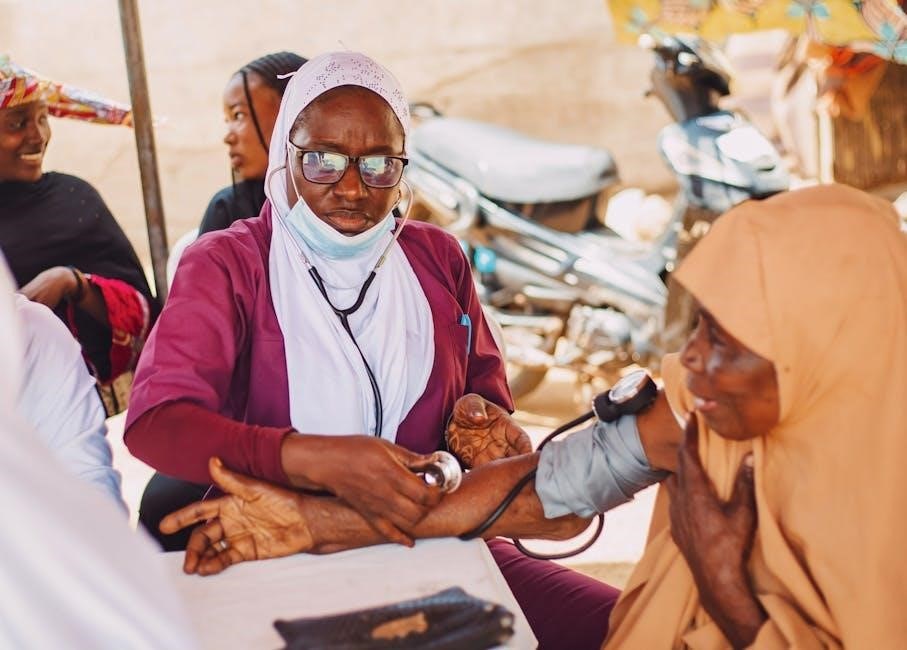When Helping Hurts by Steve Corbett and Brian Fikkert is a transformative book that explores effective ways to alleviate poverty responsibly․ First published in 2009, it challenges traditional approaches to helping the poor, offering biblical insights and practical strategies for lasting change․ With over 450,000 copies in print, it has become a cornerstone resource for individuals, churches, and organizations seeking to address poverty holistically․ The book emphasizes the importance of understanding the true nature of poverty and fostering empowerment rather than dependency․ Its principles have reshaped how many approach poverty alleviation, making it a must-read for anyone eager to make a meaningful difference․
Overview of the Book “When Helping Hurts”
When Helping Hurts by Steve Corbett and Brian Fikkert is a groundbreaking book that examines how well-intentioned efforts to alleviate poverty often fail to achieve lasting change․ It challenges readers to rethink their approaches to helping the poor, emphasizing the importance of understanding the root causes of poverty and fostering sustainable solutions․ The book provides biblical insights and practical strategies for addressing poverty responsibly, focusing on empowerment rather than dependency․ By blending theology, economics, and community development, it offers a holistic framework for individuals, churches, and organizations to make a meaningful impact․ Its principles have transformed how many engage in poverty alleviation efforts worldwide․
The Importance of Alleviating Poverty Responsibly
Alleviating poverty responsibly is crucial to ensure that efforts to help the poor lead to lasting transformation rather than dependency or harm․ Many well-meaning initiatives unintentionally perpetuate cycles of poverty by neglecting the complexities of the issue․ Responsible alleviation emphasizes empowerment, dignity, and sustainability, focusing on addressing root causes rather than just symptoms․ This approach requires a deep understanding of the cultural, economic, and relational dynamics at play․ By prioritizing responsible methods, we can create opportunities for the poor to thrive, fostering self-sufficiency and holistic development․ The book When Helping Hurts underscores the importance of this mindset in achieving meaningful and enduring change․

Foundational Concepts for Helping Without Hurting
Foundational concepts for helping without hurting include understanding poverty’s true nature, the church’s role, and Jesus’ mission to the poor, as detailed in When Helping Hurts․
Understanding the True Nature of Poverty
Understanding the true nature of poverty is crucial for effective helping․ When Helping Hurts explains that poverty is not just a lack of material resources but also includes relational, spiritual, and psychological dimensions․ It emphasizes that poverty stems from broken relationships with God, others, and creation․ This holistic view challenges simplistic solutions, urging helpers to address the root causes rather than just symptoms․ By understanding these complexities, individuals and organizations can move beyond temporary fixes and empower lasting transformation in the lives of the poor․
The Role of the Local Church in Poverty Alleviation
The local church plays a vital role in poverty alleviation, as emphasized in When Helping Hurts․ It is uniquely positioned to address the spiritual and relational dimensions of poverty, providing a holistic approach to helping the poor․ Churches can foster meaningful relationships, empower communities, and promote lasting change by addressing the root causes of poverty․ By prioritizing relational ministries over transactional ones, churches can help individuals and communities experience transformation that goes beyond temporary relief․ This approach ensures that the church serves as a catalyst for sustainable development and spiritual renewal, empowering people to break the cycle of poverty․
Why Jesus Came to Declare Good News to the Poor
Jesus’ mission to declare good news to the poor, as highlighted in When Helping Hurts, emphasizes a holistic approach to poverty alleviation․ He not only addressed physical needs but also brought spiritual hope and transformation․ By affirming the dignity of the poor, Jesus empowered them, offering a message of worth and hope․ His relational ministry serves as a model, prioritizing trust and relationships over mere resource provision․ This declaration is a call to action for believers today, urging them to continue His work by addressing both spiritual and material poverty, aligning their efforts with Jesus’ transformative mission․

Key Principles of Effective Helping
When Helping Hurts outlines key principles for effective helping, emphasizing empowerment over dependency․ It highlights the importance of relationships, proper diagnosis, and sustainable solutions to address poverty holistically, ensuring lasting change through mutual dignity and respect․ By focusing on empowerment, the book challenges readers to move beyond temporary fixes, fostering true transformation in individuals and communities․ These principles provide a biblical framework for helping the poor without causing harm, promoting a deeper understanding of poverty’s complexities․ Effective helping requires humility, wisdom, and a commitment to walking alongside those in need, rather than merely providing handouts․ This approach ensures that efforts are both compassionate and sustainable, leading to genuine, long-term impact․
A Biblical Perspective on Helping the Poor

The book emphasizes that helping the poor is not just a social act but a biblical mandate rooted in God’s love for the vulnerable․ Jesus’ ministry exemplified this, as He proclaimed the Good News to the poor and met their physical needs․ Galatians 2:10 reminds us that caring for the poor is essential to living out the Gospel․ A biblical perspective on helping the poor recognizes that poverty is not just economic but also relational, stemming from broken relationships with God, others, and creation․ Effective helping restores dignity, fosters mutual relationships, and points people to God’s redemptive work, ensuring transformative change․
The Difference Between Relief, Rehabilitation, and Development
The book distinguishes between relief, rehabilitation, and development as three critical phases in poverty alleviation․ Relief provides immediate aid to meet urgent needs, such as food and shelter, during crises․ Rehabilitation focuses on rebuilding communities and restoring dignity by equipping individuals with skills and resources․ Development, the most long-term phase, empowers communities to achieve self-sustainability through holistic transformation․ Understanding these distinctions is vital to avoid creating dependency and ensure lasting change․ By progressing from relief to development, helpers can address both symptoms and root causes of poverty, fostering empowered, resilient communities capable of thriving without ongoing external support․
Why Relationships Are More Important Than Resources
Building meaningful relationships is more critical than providing resources alone, as they foster dignity, trust, and empowerment․ While resources address immediate needs, relationships provide emotional and spiritual support, helping individuals recognize their inherent value․ When helpers prioritize relationships, they enable communities to identify their strengths and solutions, reducing dependency on external aid․ This approach aligns with the book’s emphasis on holistic change, where people are empowered to participate in their own transformation․ By valuing relationships over resources, helpers can address the root causes of poverty and promote lasting, sustainable development that honors the dignity of all individuals involved․

Diagnosis and Empowerment
Accurate diagnosis is essential for effective poverty alleviation, ensuring help addresses root causes․ Empowering communities enables them to identify strengths and solutions, fostering lasting change without dependency․
The Importance of Proper Diagnosis in Poverty Alleviation
Proper diagnosis is critical in poverty alleviation, ensuring interventions address root causes rather than symptoms․ Without understanding the complexities, efforts may unintentionally harm or create dependency․ Divine wisdom is essential for accurate diagnosis, enabling helpers to see poverty through God’s perspective and identify spiritual, social, and material dimensions․ A sound diagnosis fosters empowerment, allowing communities to identify their strengths and solutions, leading to sustainable change․ This approach emphasizes the need for humility and collaboration, recognizing that lasting transformation occurs when communities are equipped to address their challenges themselves․

How to Empower Communities Without Creating Dependency
Empowering communities without creating dependency requires shifting from paternalism to partnership․ It involves identifying and leveraging the assets, skills, and resources already present within the community․ rather than imposing external solutions․ This approach fosters dignity and ownership, ensuring sustainable change․ It’s crucial to gradually hand over responsibility to local leaders, equipping them with tools and training․ Dependency is avoided when the focus is on capacity-building and empowering individuals to address their challenges․ The goal is to create lasting change that continues even after external support is withdrawn, ensuring communities thrive independently․
Divine Wisdom in Diagnosing Poverty
Drawing from biblical principles, divine wisdom in diagnosing poverty emphasizes understanding its root causes beyond surface-level symptoms․ It involves recognizing the complex interplay of spiritual, relational, and material factors that contribute to poverty․ By seeking God’s guidance, we can discern the unique needs of each situation, avoiding simplistic or harmful solutions․ This approach prioritizes empathy, humility, and a commitment to restoring broken relationships․ True diagnosis requires prayerful reflection and a willingness to address both physical and spiritual dimensions of poverty, ensuring that efforts to help are transformative and honoring to God․

Practical Applications of the Book’s Teachings
The book provides actionable steps for individuals and churches to apply its principles, such as using it for personal study or group discussions with reflective questions․
How to Use the Book for Personal Study
When Helping Hurts is an excellent resource for personal study, offering practical insights into poverty alleviation․ Each chapter begins with reflective questions to guide individual learning and application․ Readers can explore foundational concepts, such as the true nature of poverty and the role of the local church, while engaging with biblical perspectives on helping the poor․ The book also provides actionable steps for empowering communities without creating dependency․ By dedicating time to study and reflect on its teachings, individuals can gain a deeper understanding of effective ways to address poverty responsibly and make a lasting impact․
Guidelines for Group Discussions and Study
When Helping Hurts is ideal for group discussions, offering structured content to facilitate meaningful dialogue․ Each chapter includes thought-provoking questions at the beginning and end, encouraging participants to reflect on poverty alleviation principles․ Groups can explore topics like the true nature of poverty, the role of the church, and empowering communities․ Leaders can supplement discussions with the book’s video resources, fostering deeper engagement․ Encourage active participation, personal reflection, and practical application to maximize the learning experience․ This collaborative approach helps groups apply the book’s teachings to real-world scenarios, fostering a collective commitment to responsible poverty alleviation efforts․
Practical Steps for Individuals to Make a Difference
Individuals can take intentional steps to alleviate poverty effectively․ Start by understanding the true nature of poverty through resources like When Helping Hurts․ Engage in consistent prayer for wisdom and compassion․ Advocate for policies that address root causes of poverty․ Volunteer with organizations that empower communities rather than create dependency․ Educate yourself and others about biblical principles of helping․ Support local and global initiatives that focus on rehabilitation and development․ Build meaningful relationships with those in need, prioritizing their dignity and agency․ Finally, commit to long-term involvement, recognizing that lasting change requires patience and perseverance․

Case Studies and Real-World Examples
When Helping Hurts shares real-world examples of poverty alleviation efforts, highlighting successes and lessons learned․ Churches and organizations demonstrate effective implementation of the book’s principles, showcasing transformation and challenges faced․ These case studies provide practical insights into what works and what doesn’t, equipping readers with actionable strategies for meaningful impact․
Success Stories of Poverty Alleviation
When Helping Hurts highlights inspiring success stories where communities have been transformed through responsible poverty alleviation․ Churches and organizations implementing the book’s principles have seen lasting change, empowering individuals and fostering self-sufficiency․ For instance, one community gained access to clean water and education, breaking generational poverty cycles․ Another church helped local entrepreneurs thrive through microloans and mentorship․ These stories demonstrate how focusing on relationships, dignity, and local leadership can create sustainable impact․ They illustrate the power of addressing both spiritual and physical needs, proving that effective helping leads to lasting transformation and hope for the poor․
Lessons Learned from Failed Efforts
Failed attempts to alleviate poverty often highlight the importance of responsible helping․ Many well-intentioned initiatives have unintentionally created dependency or worsened conditions by ignoring local contexts․ For example, donating food without considering local farmers can undermine economies; Similarly, imposing external solutions without community involvement often fails to address root issues․ These failures emphasize the need for proper diagnosis, empowerment, and sustainable approaches․ When Helping Hurts underscores that true progress requires understanding poverty’s complexities and involving communities in their own solutions․ Learning from these mistakes is crucial for fostering lasting, positive change rather than perpetuating cycles of dependency and harm․
How Churches Have Implemented the Book’s Principles
Churches worldwide have embraced the principles of When Helping Hurts, transforming their approach to poverty alleviation․ Many have shifted from merely providing handouts to fostering empowerment and sustainable change․ Churches have established small groups and community development initiatives, focusing on relational ministry and asset-based development․ By prioritizing the involvement of local communities, churches have helped individuals and families break cycles of dependency․ The book’s emphasis on biblical stewardship and the role of the local church has inspired innovative ministries, ensuring that aid is both compassionate and effective․ These efforts have led to lasting transformation, glorifying God and strengthening communities․

The Role of Prayer and Spiritual Warfare
Prayer is a cornerstone in poverty alleviation, addressing spiritual warfare and aligning efforts with God’s will․ It fosters sustainable change and empowers communities through faith and compassion․
Specific Prayer Requests for Poverty Alleviation
When Helping Hurts provides guidance on specific prayers for poverty alleviation, encouraging readers to pray for wisdom, provision, and the empowerment of the poor; Prayers focus on breaking cycles of poverty, healing broken relationships, and restoring dignity․ They also emphasize seeking God’s will in alleviation efforts, ensuring sustainable change․ The book prompts readers to pray for humility, cultural sensitivity, and the strength to address systemic issues․ These prayers are not just requests but a deeper alignment with God’s heart for the poor, fostering a spiritual foundation for effective and compassionate action․
Teachings on Prayer from the Book
When Helping Hurts emphasizes prayer as a foundational aspect of poverty alleviation, teaching that it aligns human efforts with God’s will․ The book highlights prayer as a means to seek wisdom, provision, and healing for broken relationships․ It encourages believers to pray for the poor, asking for their empowerment and dignity to be restored․ Prayer is also seen as a catalyst for personal transformation, enabling helpers to serve with humility and cultural sensitivity․ By prioritizing prayer, the book underscores its role in sustaining and guiding efforts to address poverty effectively, ensuring that actions are rooted in divine purpose and compassion․
Prayer as a Foundation for Effective Helping
When Helping Hurts underscores prayer as the essential foundation for effective poverty alleviation efforts․ Prayer grounds helpers in God’s will, equipping them with wisdom, provision, and healing for broken relationships; It transforms both the helper and the helped, fostering humility, cultural sensitivity, and a deeper understanding of poverty’s complexities․ By prioritizing prayer, individuals and communities ensure their efforts are sustained by divine guidance, compassion, and empowerment․ This spiritual foundation enables lasting change, aligning human actions with God’s redemptive purposes and ensuring that help is offered in ways that dignify and uplift the poor․

Addressing the Root Causes of Poverty
The book emphasizes understanding poverty’s true nature, addressing both material and relational poverty․ Sustainable solutions require empowering communities and fostering dignity through holistic, gospel-centered approaches that break cycles․
Breaking the Cycle of Poverty
Breaking the cycle of poverty requires addressing its root causes, such as lack of education, unemployment, and systemic injustices․ The book emphasizes the need for empowerment through holistic approaches that address both material and relational poverty․ By fostering dignity and self-sufficiency, communities can overcome dependency and achieve lasting change․ Proper diagnosis of poverty’s complexities is essential to create effective strategies․ Empowering individuals through education, job creation, and community-driven solutions helps break generational cycles․ Prayer and spiritual warfare are also highlighted as foundational elements in sustainably addressing poverty’s spiritual and physical dimensions․
Empowering Lasting Change
Empowering lasting change involves moving beyond temporary fixes to address the root causes of poverty; The book emphasizes the importance of sustainable development, where communities are equipped to take ownership of their progress․ Education, job creation, and access to resources are key components․ By fostering dignity and self-sufficiency, individuals and communities can break free from cycles of dependency․ The local church plays a vital role in this process, providing spiritual and practical support․ True empowerment requires a holistic approach that addresses both physical and spiritual needs, leading to transformative and lasting change in the lives of the poor․
The Role of Education in Poverty Alleviation
Educational empowerment is a cornerstone in breaking the cycle of poverty, as highlighted in When Helping Hurts․ By providing access to quality education, individuals gain the tools to improve their socio-economic status․ Literacy and vocational training enable people to secure better employment opportunities, fostering self-sufficiency․ Education also equips communities to make informed decisions about health, finances, and resource management․ The book underscores that education is not just about knowledge but about restoring dignity and hope․ It challenges readers to invest in educational initiatives that empower individuals to overcome poverty and create sustainable change for future generations․
When Helping Hurts leaves readers with a clear call to action: poverty alleviation requires intentionality, empathy, and a commitment to empowerment․ By prioritizing relationships over resources and focusing on long-term, sustainable solutions, individuals and churches can make a lasting impact․ The book challenges readers to move beyond temporary fixes and instead address the root causes of poverty․ Ultimately, it encourages believers to view poverty alleviation as an integral part of living out the gospel, inspiring hope and transformation in communities worldwide․ The journey to help without hurting is ongoing, but with wisdom and prayer, lasting change is possible․
A Summary of Key Takeaways
When Helping Hurts emphasizes that poverty alleviation requires more than temporary fixes; it demands a deep understanding of poverty’s root causes․ The book highlights the importance of empowerment over dependency, stressing that relationships and holistic development are key to lasting change․ It challenges readers to move beyond relief efforts to focus on rehabilitation and sustainable development․ The local church is identified as a crucial player in poverty alleviation, equipped to address both spiritual and physical needs․ By prioritizing prayer, proper diagnosis, and community empowerment, individuals and churches can help without hurting, fostering transformative and gospel-centered change in the lives of the poor․
The Ongoing Challenge of Poverty Alleviation
Poverty remains a profound and complex issue, requiring more than temporary solutions․ Many efforts fail to address root causes, leaving communities in cycles of dependency․ When Helping Hurts underscores the need for sustainable development and empowerment, rather than mere relief․ It challenges readers to rethink their approaches, emphasizing the importance of understanding poverty’s spiritual, social, and economic dimensions․ True transformation occurs when communities are equipped to solve their own problems, fostering dignity and self-sufficiency․ The book calls for a balanced approach, combining practical strategies with spiritual wisdom, to create lasting change and break the cycle of poverty effectively․
Encouragement for Continued Involvement
Engaging in poverty alleviation requires persistence and faith․ When Helping Hurts encourages believers to remain committed, emphasizing that lasting change is a long-term process․ By focusing on empowerment and relationships, individuals and churches can make a meaningful impact․ The book inspires readers to prayerfully seek wisdom, ensuring their efforts bring dignity and hope to those in need․ Continued involvement in poverty alleviation not only transforms lives but also aligns with God’s heart for justice and compassion․ Stay invested, as your contributions can lead to lasting change and glorify God in the process․
